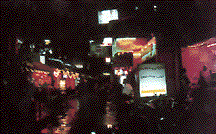
As an average 18-year-old student, I was looking for something to make my final year of high school interesting and memorable. I soon found myself enrolled in an International co-op program and on a plane to Thailand for what I thought would be the longest four months of my life. I arrived in Thailand completely open-minded and ready to learn and experience as much as I could, but at the same time I was completely ignorant to issues that threatened the country. When I started my co-op placement, one of the most threatening issues of Thailand smacked me right in the face.

At an age when most young girls should be going to school and worrying about what boy likes them or what to wear, the same age of girls in Northern Thailand are faced with the risk of prostitution. My co-op placement was at a Non-Governmental Organization (NGO), Development and Education for Daughters and communities. The program is based on the prevention of child prostitution and child labour. The program supports over 350 girls financially to continue their education in grades 7 through 9, which is not mandatory in the Thai education system. Another program is the Youth Leadership program which works with a group of girls to enhance their leadership and decision making skills in the hope that they can return to their village and become a positive leader in their community. In all, the program supports over 450 girls to aid in the prevention of the rising numbers of young girls in prostitution.
As I worked in Northern Thailand, I became more aware of the problem of child prostitution and its complications. There are many factors that put a young girl at risk. One is her age, a young tender age of 11 or 12 years old. Another risk is if their mother, sister, aunt or friends have already left and are working in larger cities like Bangkok and Phattaya. A major factor is when their family is extremely poor and/or addicted to drugs.These factors threaten these girls and their families because there is money involved and this money becomes very important. How money becomes a part of the problem is when a brothel agent enters a village to identify families who are financially in debt and to offer substantial amounts of money for their daughter. The thing that these families are not told is that their daughters will be selling themselves for sex; they are told that their daughters will be working in homes as maids or in beauty parlours. The money that these families get for their daughters becomes a debt on the daughter and she has to sell her body everyday to pay off that debt put on her by her family.
These girls are severely abused both sexually and physically when they are in the brothels; they live in small 3 x 5 foot rooms with poor lighting and poor conditions. They receive very little food and work extremely long hours from early morning to the wee hours of the night. They are abused by both their clients and the brothel owners. The brothel owners also share these girls with their friends for free, so the girls don't receive money to help pay off their debt. As well as abuse there is the risk of contracting the HIV virus or other sexually transmitted diseases. Condoms are offered but clients often don't use them.
The governments involvement in the issue of child prostitution is that it is illegal, but the laws are not enforced and the government has not acknowledged that the problem exist, so therefore,"if it ain't broke don't fix it." Another restraint that the Thai government has upon the villagers of Northern Thailand, is that they don't have identity cards. Without an identity card they cannot travel freely through the country as well as to other countries and they cannot enroll in the formal government education system. The group of people that this affects the most is the hill tribes of northern Thailand, minority groups such as Akha, Lao, Yao and the other minority groups. It is very expensive and a lenghty process to apply for this card, when the money and availability is not accessible to them.
Everything that I have learned in my experience in Thailand has made a major impact on my life and the way I view and value things in my life now. I had an open view on many aspects of my life before I left and now, since I have come home, those views have broadened to understand more about the world and its issues and how I can be a part of the process to help prevent and solve the problems concerning youth in our world. It has made me more aware of what I have in my life and the things that I value and make priority, those have changed and I have a better understanding of things that I want to do. I have given my time to volunteer and help those who are less fortunate than me as well as getting involved in organizations and programs that interest me. I now understand more about myself which I think I would never have understood before my experience. Not only is child prostitution in Thailand, it is all over the world, even in my own country Canada. As soon as we the people and the government, acknowledge we have a world-wide problem and we start working together, we can create a change and this change can help save the lives of girls in the present and in our future.
TG Magazine / The Students Commission
© 1997 le magazine TG / la Commission des étudiants
